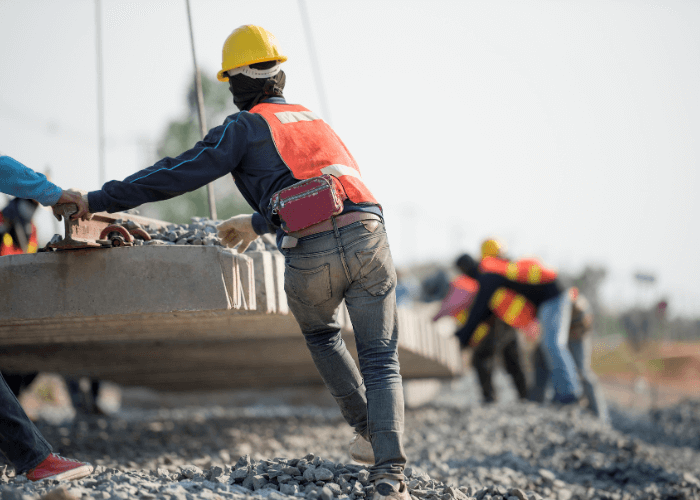Top 4 construction trends moulding the industry

Construction is an industry that literally shapes the world around us. From towering skyscrapers to sprawling infrastructure projects, construction professionals have the power to turn dreams into reality. There is an undeniable sense of satisfaction that comes from seeing a project come to life, knowing that your hard work and expertise have contributed to its success.
Global construction work is forecasted to grow by over US$4.2 trillion over the next 15 years. In order to reach this market growth, advancements in areas such as sustainable construction, modular and prefabricated construction, and digitalization and automation will be key to boosting construction productivity.
And the construction industry is indeed evolving, driven by innovative technologies, changing regulations, and growing environmental concerns. Among the top soft skills needed for a successful construction career, is a growth mindset.
Staying ahead of the curve is crucial for industry players, across various career paths in construction, and being aware of the top trends shaping construction can make all the difference.
Delve into four trends moulding the construction industry:
Sustainable construction
Sustainable construction has emerged as a paramount concern in recent years. With the pressing need to reduce environmental impact and promote energy efficiency, construction practices are adapting to incorporate sustainable materials and renewable energy systems.
Governments across the world have committed to hitting net zero emissions by 2050. In the UK alone, it’s reported that we need to spend £45 billion over the next 15 years to retrofit our homes. The growing sustainability focus of projects means a greater need for green skills in construction.
Modular and prefabricated construction
Modular and prefabricated construction techniques have gained immense popularity due to their efficiency, cost-effectiveness, and reduced construction timelines. But what is modular construction? It involves producing standardised components of a structure, typically made in an off-site factory, then assembling them on-site. By utilising off-site fabrication and assembly, these methods minimise material waste and enhance quality control. “Prefabrication” is used interchangeably with “Modular construction”. McKinsey reports modular construction to have an impact on accelerating project timelines by 20% to 50%.
According to a Deloitte survey, 46% of respondents will likely invest in prefabrication and modular construction capabilities next year. They predict that 2023 will likely experience increased adoption rates as more developers and contractors look to capitalise on building in controlled environments to drive operational efficiencies.
Digitalization and automation
Digitalization is enabling a manufacturing-led approach to buildings and infrastructure. It is supporting improvements in safety, quality, efficiency, and sustainability, while reducing costs to remain competitive in the marketplace. Technologies like drones, robotics and Building Information Modeling (BIM) are transforming traditional construction practices.
If we take a closer look at BIM software for example, it serves as a powerful tool for organisations to effectively manage information across the entire lifecycle of a construction project, seamlessly connecting data throughout the value chain. BIM facilitates the creation of detailed descriptions of every aspect of the build, utilising a blend of 3D technology, structured data, and collaborative handover methods. Harnessing the capabilities of technology such as BIM allows construction professionals to streamline project coordination, improve productivity, enhance collaboration, and optimise project outcomes from inception to completion.
Focus on safety
Health and safety in construction has always been a top priority in the industry, but recent years have seen a renewed focus on creating safe working environments.
The UK has seen 61,000 cases of non-fatal work-related injuries in recent years, which has underscored an urgency around improved health and safety. Advanced safety measures such as wearable technology – for example, hard hats with proximity sensors and location tracking – training programs, and enhanced regulatory compliance are vital in minimising accidents and protecting workers. This all means a rising demand for health and safety construction workers.
At TRS we prioritise safety in construction recruitment, actively seeking professionals with comprehensive knowledge of safety protocols and the ability to implement them effectively. From Principal Process Safety Engineers to HSE Advisors, we connect our clients with safety-focused experts who can help maintain a secure working environment.
Are you ready to embrace the future of construction?
As the construction industry evolves, staying abreast of the latest trends is essential for success. If you're looking for a career where you can make a tangible impact on the world, construction is the place to be. Sustainable construction, modular and prefabricated construction, digitalization and automation, and a renewed focus on safety are transforming the industry, shaping how projects are planned, designed, and executed. These key advancements streamline, improve productivity, and enhance safety on-site.
At TRS Staffing Solutions, we’re experts in construction recruitment. We connect skilled and talented professionals with progressive companies that are embracing and driving these trends forward. If you’re looking for a role where you can innovate, why not explore our current health and safety construction jobs or construction management jobs?
Can’t find what you’re looking for? Send your CV to be the first to hear about our latest jobs.
Stay informed with our latest insights
Our insights
Our latest jobs
Negotiable
United States, Torrance, California
Negotiable
United States, San Francisco, California




.png)
.png)